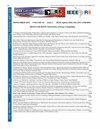提高配电网托管能力和减少电力损耗策略的评估与模拟
IF 1.3
4区 工程技术
Q3 COMPUTER SCIENCE, INFORMATION SYSTEMS
引用次数: 0
摘要
配电系统越来越多地采用光伏(PV)系统。虽然光伏系统的渗透在一定程度上是有益的,但超过这个程度,就会开始产生与电压水平和电网稳定性相关的问题。在现代配电系统规划中,必须确定一个最佳运行点,在这个点上,光伏系统的集成可支持电压曲线,而不会造成任何不利影响。本文的目的是通过一种优化算法,反复使用功率流模拟和多目标遗传算法,探索和评估提高配电系统托管能力和降低功率损耗的策略。本文制定了利用传统配电系统资产的不同策略,以避免新的系统加固。这些策略包括网络重新配置、电容器切换、有载分接开关切换、电压-伏特控制设置以及所有策略的组合。为了评估每种方法的效率,对以 OpenDSS 为模型的 IEEE 123 总线配电系统进行了综合模拟研究,并使用 Python 创建的算法来控制优化过程。本文章由计算机程序翻译,如有差异,请以英文原文为准。
Assessment and Simulation of Strategies to Enhance Hosting Capacity and Reduce Power Losses in Distribution Networks
Distribution systems are increasingly experiencing the penetration of photovoltaic (PV) systems. Although PV penetration is beneficial up to a point, beyond that point, it begins to generate issues related to voltage levels and grid stability. In modern distribution system planning, it is essential to identify an optimal operational point where the integration of PV supports the voltage profile rather than causing any adverse effects. The purpose of this paper is to explore and evaluate strategies to enhance Hosting Capacity and reduce Power Losses in distribution systems through an optimization algorithm that iteratively uses power-flow simulations and a Multi-Objective Genetic Algorithm. Different strategies taking advantage of conventional distribution system assets are formulated to avoid new system reinforcement. The strategies include Network Reconfiguration, Capacitor Switching, On-Load Tap Changer Switching, Volt-VAR Control Settings and the Combination of all strategies. To evaluate the efficiency of each approach, a comprehensive simulation study is conducted on the IEEE 123 bus distribution system modeled in OpenDSS, with an algorithm created in Python to control the optimization process.
求助全文
通过发布文献求助,成功后即可免费获取论文全文。
去求助
来源期刊

IEEE Latin America Transactions
COMPUTER SCIENCE, INFORMATION SYSTEMS-ENGINEERING, ELECTRICAL & ELECTRONIC
CiteScore
3.50
自引率
7.70%
发文量
192
审稿时长
3-8 weeks
期刊介绍:
IEEE Latin America Transactions (IEEE LATAM) is an interdisciplinary journal focused on the dissemination of original and quality research papers / review articles in Spanish and Portuguese of emerging topics in three main areas: Computing, Electric Energy and Electronics. Some of the sub-areas of the journal are, but not limited to: Automatic control, communications, instrumentation, artificial intelligence, power and industrial electronics, fault diagnosis and detection, transportation electrification, internet of things, electrical machines, circuits and systems, biomedicine and biomedical / haptic applications, secure communications, robotics, sensors and actuators, computer networks, smart grids, among others.
 求助内容:
求助内容: 应助结果提醒方式:
应助结果提醒方式:


